Lettuce Study
Full-Scale, Mixed Load Container Testing with Air Cleaned by Bluezone® Model 2400
Summary
In three week test, Bluezone reduced russet spotting in lettuce by 78%.
Objective
To quantify the effectiveness of the Bluezone Model 2400 in maintaining quality and extending the shelf life of FF&V stored or shipped in mixed loads.
Methods and Materials
We conducted a side-by-side test of a mixed produce load over a 3-week storage period, to measure produce quality and the shelf life extension achieved with Bluezone Fresh Preservation Technology.
Configuration
- Two, 8’X8’X20’ Refrigerated Containers, each set to 34°F with ventilation sufficient to maintain CO2 below 1%.
- Mixed produce load of ethylene sensitive and ethylene producing FF&V.
- Temperature, humidity, carbon dioxide and ethylene measurements taken at regular intervals.
- One container with Bluezone, second container without Bluezone.
Duration
- 21 Days of Refrigerated Storage
- 5-10 Additional days of ambient temp storage for specified FF&V
Results
The Bluezone Model 2400 maintained ethylene concentration in the mixed load container at 0.6ppm throughout the 21-day test. Uncontrolled ethylene concentration was 10ppm.
This dramatic reduction in ethylene concentration had a significant impact on the quality of ethylene sensitive produce, such as lettuce.

Test Results for Lettuce
Storing lettuce in a mixed load environment with Bluezone operating to clean the air of ethylene decreased the incidence of russet spotting in iceberg lettuce by 78%.

Conclusion:
Use of the Bluezone Fresh Preservation Technology significantly reduced russet spotting in wrapped iceberg Lettuce over the 21-day storage period.
